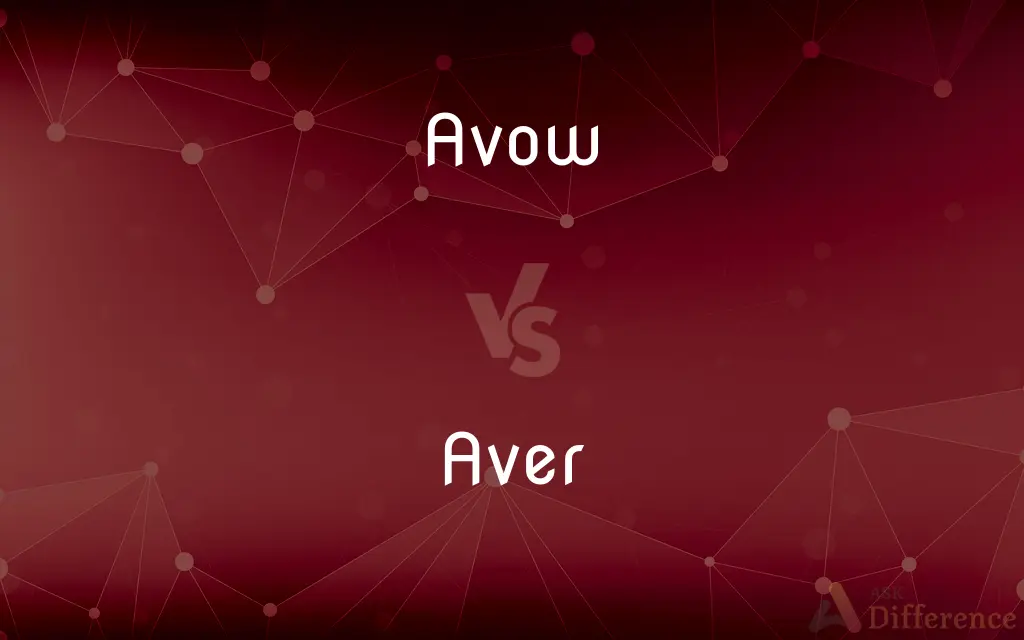Avow vs. Aver — What's the Difference?
By Maham Liaqat & Urooj Arif — Updated on March 21, 2024
Avow involves openly declaring something to be true with strong confidence, while aver implies stating something is true in a firm and solemn manner, often used in legal contexts.

Difference Between Avow and Aver
Table of Contents
ADVERTISEMENT
Key Differences
Avow is an act of openly and confidently acknowledging or declaring something as true, often used to express personal conviction or admission. It carries a connotation of personal commitment and is typically used in contexts where the speaker wishes to emphasize their honesty or belief in a statement. Whereas, aver is more formal and is commonly used in legal or formal statements to assert something is true, with an emphasis on the reliability and factual nature of the assertion. Aver is often accompanied by evidence or used in situations where the truth of the statement is expected to be challenged.
Avowing something usually involves a personal element, suggesting that the speaker has a direct connection or commitment to the truth of their statement. It often carries an emotional or ethical weight, implying a sense of personal honor tied to the truth of the declaration. On the other hand, averring does not necessarily imply a personal stake in the information being true but focuses on the factual accuracy and the speaker's confidence in the truth of the statement based on evidence or knowledge.
Avow is typically used in a more personal or informal context, where the speaker wishes to make a strong, personal declaration or admission. This usage reflects a desire to be transparent and is often related to personal beliefs or feelings. Conversely, aver is used in contexts requiring formal verification or assertion of facts, such as legal documents, scholarly articles, or formal disputes, where the emphasis is on the truthfulness and accuracy of the information rather than personal conviction.
The choice between avow and aver often depends on the context and the speaker's intention. Avowing something can be seen as a bold, personal statement of truth, reflecting a commitment to honesty or belief. Aver, however, is used when the speaker needs to assert the truth of a statement in a manner that anticipates skepticism or requires formal validation, highlighting the factual basis of the assertion.
While both avow and aver involve declarations of truth, the nuances of their use reflect differences in the level of formality, the nature of the commitment to the truth, and the expected response from the audience. Avowing tends to be more about personal conviction and transparency, whereas averring is about asserting factual accuracy in a formal or challenging context.
ADVERTISEMENT
Comparison Chart
Connotation
Personal conviction and openness
Formal assertion and solemnity
Usage Context
Personal, emotional, or ethical statements
Legal, formal, or scholarly statements
Implication
Personal commitment to truth
Confidence in factual accuracy
Emotional Weight
Often implies emotional or ethical involvement
Focuses on factual accuracy, less on emotion
Typical Format
More likely to be used in speech or informal writing
More likely in formal writing, legal documents, or disputes
Compare with Definitions
Avow
To declare confidently and openly as a matter of fact.
She avowed her belief in justice for all.
Aver
To assert formally as a fact.
The scientist averred the results of the experiment were conclusive.
Avow
To state or profess openly.
She avowed her intention to fight for equality.
Aver
To state positively as being true.
He averred his innocence throughout the trial.
Avow
To acknowledge or admit something openly.
He avowed his mistake without any hesitation.
Aver
To assert or affirm with confidence.
The witness averred that she had seen the defendant at the scene.
Avow
To declare openly and boldly, as a matter of conviction.
They avowed their commitment to the cause.
Aver
To declare to be true in a formal or legal manner.
The document averred the legality of the transaction.
Avow
To assert or confess openly.
The author avowed that the story was inspired by real events.
Aver
To affirm with conviction.
She averred her support for the policy.
Avow
Assert or confess openly
He avowed his change of faith
He avowed that he had voted Labour in every election
Aver
State or assert to be the case
‘I don't have to do anything—it's his problem,’ he averred
He averred that he was innocent of the allegations
Avow
To acknowledge or declare openly and unashamedly
Avowed their faith in the electoral process.
Aver
To affirm positively; declare
"Liberal politicians ... found it necessary to aver that they were in favor of rigid economy in public spending too" (John Kenneth Galbraith).
Avow
To state positively; declare
"Various church councils have avowed that evolution poses no threat to supernatural belief" (Frederick C. Crews).
Aver
(Law) To assert formally as a fact.
Avow
(transitive) To declare openly and boldly, as something believed to be right; to own, acknowledge or confess frankly.
Aver
(ambitransitive) To assert the truth of (something); to affirm (something) with confidence; to declare (something) in a positive manner.
Avow
(transitive) To bind or devote by a vow.
Aver
To justify or prove (an allegation or plea that one has made).
Avow
(legal) To acknowledge and justify, as an act done. See avowry.
Aver
To avouch, prove, or verify the existence or happening of (something), or to offer to do so.
Avow
(obsolete) avowal
Aver
A beast of burden; chiefly a workhorse, but also a working ox or other animal.
Avow
To declare openly, as something believed to be right; to own or acknowledge frankly; as, a man avows his principles or his crimes.
Which I to be the of Israel's GodAvow, and challenge Dagon to the test.
Aver
An old, useless horse; a nag.
Avow
To acknowledge and justify, as an act done. See Avowry.
Aver
A work horse, or working ox.
Avow
To bind, or to devote, by a vow.
Aver
To assert, or prove, the truth of.
Avow
Avowal.
Aver
To avouch or verify; to offer to verify; to prove or justify. See Averment.
Avow
A vow or determination.
Aver
To affirm with confidence; to declare in a positive manner, as in confidence of asserting the truth.
It is sufficient that the very fact hath its foundation in truth, as I do seriously aver is the case.
Then all averred I had killed the bird.
Avow
To declare or affirm solemnly and formally as true;
Before God I swear I am innocent
Aver
Report or maintain;
He alleged that he was the victim of a crime
He said it was too late to intervene in the war
The registrar says that I owe the school money
Avow
Admit openly and bluntly; make no bones about
Aver
To declare or affirm solemnly and formally as true;
Before God I swear I am innocent
Common Curiosities
Can avow and aver be used interchangeably?
While avow and aver both involve asserting something as true, they differ in formality and context, making them not fully interchangeable.
Is aver always formal?
Aver is typically used in formal contexts, especially where factual accuracy is paramount, such as legal documents or scholarly articles.
How is aver used in legal contexts?
In legal contexts, aver is used to assert something as true, with a focus on the factual accuracy and often supported by evidence.
Does avowing imply honesty?
Yes, avowing implies a level of honesty and transparency, reflecting the speaker's personal commitment to the truth.
What is the emotional weight behind avowing?
Avowing often carries emotional or ethical weight, implying a sense of personal honor or conviction in the truth of the declaration.
What makes a statement an avowal?
A statement becomes an avowal when it is openly and confidently declared as true, reflecting personal conviction or admission.
What is the significance of averring in disputes?
Averring in disputes is significant as it asserts the truth of a statement in a manner that anticipates skepticism or requires validation.
Can a personal belief be avowed?
Yes, personal beliefs can be avowed, reflecting the individual's strong conviction and openness about those beliefs.
How does context affect the use of avow and aver?
The choice between avow and aver depends on the context, with avow being more personal and informal, and aver more formal and focused on factual accuracy.
Can avow be used in formal writings?
Avow can be used in formal writings, especially when expressing a strong, personal declaration or belief, but it's less common than in speech.
What kind of evidence supports averments?
Averments are usually supported by factual evidence or detailed information to back up the assertion of truth.
What does it mean to avow something?
To avow something means to declare it confidently and openly as true, often reflecting a personal commitment or belief.
Does avow involve personal experience?
Avow can involve personal experience, especially when the speaker is directly connected to or has a deep conviction about the statement being made.
Is aver used outside of legal contexts?
While commonly used in legal contexts, aver can also be used in any situation requiring formal or solemn assertion of facts.
How do avow and aver reflect on the speaker's intentions?
Avow reflects a speaker's intention to be transparent and personally committed, while aver indicates an intention to formally assert factual accuracy.
Share Your Discovery

Previous Comparison
Cilia vs. Stereocilia
Next Comparison
Heavy vs. WeightyAuthor Spotlight
Written by
Maham LiaqatCo-written by
Urooj ArifUrooj is a skilled content writer at Ask Difference, known for her exceptional ability to simplify complex topics into engaging and informative content. With a passion for research and a flair for clear, concise writing, she consistently delivers articles that resonate with our diverse audience.














































